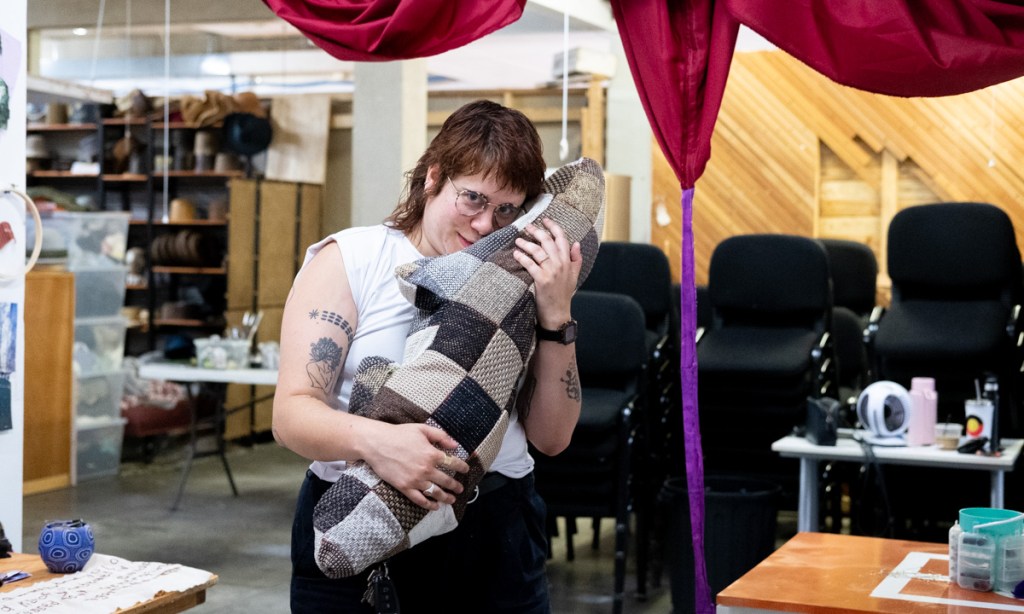A solo exhibition at The Mill is giving voice to lesser heard stories.
Making art as one
Tikari Rigney is a non-binary Kaurna, Narungga and Ngarrindjeri visual artist, curator and poet.
In February, they will launch Snug Diaries, their first solo exhibition at The Mill and the culmination of their time as the 2022 Sponsored Studio recipient.
The collection of works brings to the fore the oftentimes overlooked stories and experiences of intersectional First Nations creatives.
Snug Diaries
6 February—24 March
The Mill
154 Angas Street, Adelaide 5000
Opening Night Event: Friday, 10 February
More info
Stay up to date with The Mill’s events, workshops and happenings via their website, Instagram or newsletter.
“I think that my practice is so much about my identity [within] the context of my South Australian arts community, specifically, the culturally diverse and queer communities. I’m representing different communities in this solo show,” Tikari tells CityMag over the phone.
Partway through their residency at The Mill, Tikari received an Arts South Australia Community grant to start the Solidarity Collective and bring together local artists who identify as First Nations or people of colour (POC).
Tikari’s initiative was prompted by their experience at art school, which, while enjoyable in parts, was “really difficult” in that it was limited in reflecting their standing as an intersectional artist.
They explain the new venture is “a place for artists… to come together… to share the tough experiences of a quite male-dominated, white-centric arts culture within South Australia, but also to learn from other people’s culture and celebrate our diversity excellence”.

The concept for the collective harks back an important quality instilled in Tikari’s by their grandmother: give back to community.
“For me not to bring my community along with me on that journey seems so foreign, because that’s what my grandmother and my ancestors have done,” they say.
“And that’s a key thing to my life in general and, specifically, to my practice.”
The Solidarity Collective numbers around 15 and includes dancers, actors, performance artists and a tattoo artist.
Meeting casually since October for “a cup of tea and a yarn”, the group provides a safe space to share lived experiences, find out about opportunities and celebrate wins. It also provides a community setting for multi-disciplinary artists to share, create and work collaboratively.
Tikari says the collective has had a noticeable influence on their practice and they’ve “changed tack quite a few times because of the things… talked about in those meetings”.

Combining their visual arts and poetry practices, Tikari creates soft sculptures embroidered with poems. The fabrics come from repurposed clothes worn by them or people close to them, providing an added layer of meaning.
Tikari is deliberate in their intent to create highly tactile art, and are keen to break down the no-touch rules of art galleries.
“I really want to encourage people to touch the artwork, especially the ones with the embroidery. A lot of my poems are very vulnerable, personal and quite difficult sometimes to create, but [they are also] cathartic.
“Through my embroidery, I was re-looking at [my poems] and kind of reliving them in an excruciatingly long amount of time. Because embroidery takes time.
“[Physically engaging with the fabrics is] one of the pleasures I allow myself while making. And I really want to share that.
“I think it’s a nice contrast to words that are in the poems and the really painful emotions or heavy things. The contrast of that and beautiful, luscious, worn materials that have stories behind them as well.”

Touch the art, hug the art
The Mill’s visual arts curator Adele Sliuzas says the multidisciplinary arts organisation supports more than 1000 artists through its broader programs each year, many of whom are early in their careers.
“A lot of artists come to us here at The Mill after they have been maybe working from their bedroom, and they want to be able to have space to create but also to connect,” Adele says.
“That was an important consideration of the Solidarity Collective as well.
“To be able to make a space and a time that is dedicated to bringing people together – so they can chat about what they’re up to, what they’re making, what they’re thinking about, struggles that they might be having, or little wins that they’ve had.
“And to be able to share that with other people and to celebrate everything.”
Tikari says this inclusiveness extends to their own audience. They would like to see people from First Nations, POC and queer communities, and those dealing with gender dysphoria, at the exhibition and for them to find a sense of “solidarity” in the artwork.
“I didn’t get that representation when I was at art school, but I want that young, art-obsessed kid that’s maybe struggling with their identity to come through and touch and engage with my artwork and feel like that’s a safe space,” they say.
Tikari Rigney’s solo exhibition opens 10 February and will include an artist talk with them and the Solidarity Collective.
The Mill’s Sponsored Studio program is presented in co-operation with Mahmood Martin Foundation.





